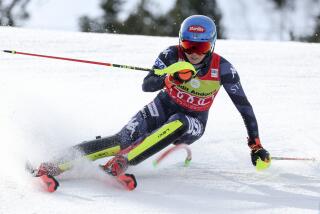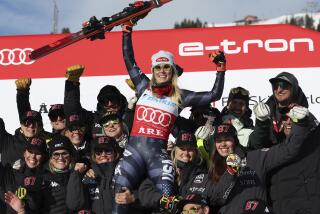World Cup Skiing : McKinney Loses Her Slalom Title to Erika Hess
- Share via
SOUTH LAKE TAHOE, Calif. — This has been the hardest winter of Tamara McKinney’s ski-racing career, and it didn’t get any easier at the end.
In her final World Cup race of the 1984-85 season Friday, she finished fifth behind winner Erika Hess and lost the slalom title to the Swiss woman by just seven points. The final totals: Hess 100, McKinney 93.
“Today, I had the worst feeling I’ve had all year,” McKinney said. “In the first run, especially, I didn’t feel good on my skis. I didn’t ski really free at the top, where it was slick.”
As a result, she was seventh after the first run, .94 of a second behind Hess’ leading time of 45.52 seconds.
In ski-racing, that can be an eternity.
Under the experimental format being used for the first time here at Heavenly Valley, the top 30 in the first run started the second run in reverse order of finish, meaning McKinney was seventh from the last, Hess last. McKinney momentarily took the lead with a time of 44.95 for a total of 1:31.41, but she quickly dropped to fourth with only Hess still to come down.
The 23-year-old two-time World Cup overall champion had to place second or better to deny McKinney her second straight slalom title. No problem. She also had the fastest second run, 44.34, and won the race with a total of 1:29.86.
Perrine Pelen of France was second in 1:30.10, Malgorzata Tlalka of Poland third in 1:30.36 and Brigitte Gadient of Switzerland fourth in 1:31.10.
“Nobody told me I had to finish at least second,” Hess said in excellent English. “At the start, I try to shut everyone else out and concentrate on skiing my own race. I don’t want any distractions.”
Said McKinney: “Yeah, I heard somebody say she needed a second, but there was nothing I could do about it.”
McKinney didn’t seem especially heartbroken over the day’s events. She’s been on top before, having won the World Cup overall championship in 1983. And the way this season has gone, it was almost a fitting climax.
“It’s been a difficult year,” the part-time resident of Squaw Valley said, “the hardest of my seven years on the World Cup tour. The first six years, we had a different approach to training and to life styles.
“This year, everything changed. We had all new coaches and servicemen. It was a hard transition. And I also had some personal things happen.”
Less than two weeks ago, her father, one-time champion steeplechase jockey Rigan McKinney, died after a long illness. Tamara was just then recovering from an ankle injury suffered at Copper Mountain, Colo., in mid-February. Yet, only three days after her father’s death, she raced at Waterville Valley, N.H., and won, moving into the World Cup women’s slalom lead.
Despite losing the title here, McKinney said: “It’s been a little rough. But maybe a vacation will help improve my attitude. Until this season, I never even thought about the end ever being in sight. Right now, I plan to ski at least one more season, but if next year is like this one, I may have to think about doing something else with my life.”
Asked if the retirement last spring of Christin Cooper and the impending departure of Cindy Nelson has changed her role on the U.S. Ski Team, because she will soon be the senior woman, McKinney said, “I don’t exactly feel like an old lady at 22.
McKinney said that her problems definitely were not related to any post-Olympic year letdown. “Actually,” she said, “it was nice not to have the hype we had at Sarajevo. That just about drove me batty.”
She also said: “This year was in no way anti-climactic. We had the World Championships, and the World Cup is still the World Cup.”
The World Cup is also a bit different here, in both the women’s race Friday and the men’s slalom today. Instead of following the traditional manner of having the top six finishers in the first run ski first in the second run, the field was cut to the fastest 30, and No. 30 led the parade.
The immediate reaction of racers and coaches was skeptical at best.
“It was OK here today,” Hess said, “because the course was in perfect shape and the weather was beautiful. But in Europe many times, the weather is not so good, and the course can become very bad after the first few racers. Then it would not be fair for the fastest skiers to start so far down.”
Tamara McKinney wasn’t about to let anything else spoil what was left of her day. “I’m just happy to be back near my home in Squaw Valley, skiing before my friends and with the crowd cheering me on and waving banners for me like they do for the Europeans over there.”
One of the cheering spectators was Sheila McKinney, Tamara’s older sister, who was a promising international competitor until she suffered severe head injuries during a 1977 World Cup downhill at this same ski resort. The accident ended her racing career and almost cost her life.
“This was her first time back at Heavenly Valley,” Tamara said, “She didn’t show any special feeling about it one way or the other. Sheila has had a hard life since then, but. . . . “
Somehow, she conveyed the feeling that her own troubles this season weren’t really that bad, after all. And for now, she’s just happy to be home.


